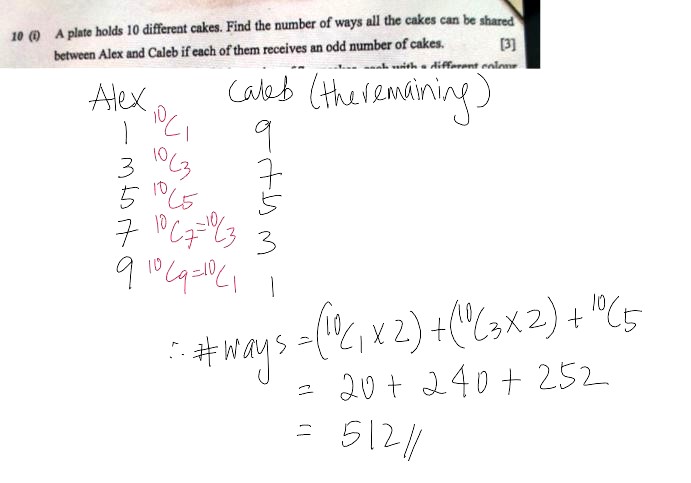Ask Singapore Homework?
Upload a photo of a Singapore homework and someone will email you the solution for free.

Question
junior college 2 | H1 Maths
One Answer Below
Anyone can contribute an answer, even non-tutors.
Need help on this question, thanks in advance
Alex takes 1, Caleb takes 9
Alex takes 3, Caleb takes 7
Alex and Caleb take 5 each
Alex takes 7, Caleb takes 3
Alex takes 9, Caleb takes 1.
Alex to take 1, Caleb 9 :
Number of ways = 10C1= 10
(Choose 1 out of 10 choices for Alex , Caleb takes the other 9 cakes)
If the roles are reversed,
Caleb takes 1 , Alex 9 :
Number of ways = 10C1= 10
(Choose 1 out of 10 choices for Caleb , Alex takes the other 9 cakes)
Total ways here = 10 x 2 = 20
We realise that the number of ways is the same for the role reversal.
Next, for the scenario where Alex gets 3 and Caleb 7, it also has the same number of ways as the role reversal.
So total number of ways there
= 2 x 10C3
= 2 x 120
= 240
(Choose 3 cakes out of 10 for Alex , Caleb takes the other 7 , and vice versa)
BUT,
For the scenario where they get 5 each, there is no reversal as that would be a double count.
Eg. If Alex gets cakes 1,2,3,4,5, Caleb would have to take cakes 6,7,8,9,10.
If we include the role reversal, that would include Caleb choosing 6,7,8,9,10 again.
So the number of ways here = 10C5 = 252
Total ways = 20 + 240 + 252 = 512
Another thing to note is that, whether we can start with Alex/Caleb choosing 1 or 9 first, the number of ways is the same.
Eg.
① Let Alex choose 1 cake first , the other 9 are taken by Caleb.
Number of ways = 10C1
= 10! / ( (10-1)! 1!)
= 10! / (9!1!)
= 10
② But if we let Caleb choose 9 cakes first instead, this has the same result as ① as that leaves the same number of cakes (1 cake) for Alex.
Number of ways = 10C9
= 10! / ( (10-9)! 9!)
= 10! / (1!9!)
= 10
From this we can see that nCr = nC(n-r)
We can also have the scenarios :
③ Alex chooses 9 cakes first
④ Caleb chooses 1 cake first
③ and ④ 's results are equivalent just like how ① and ②'s are equivalent.
To find the total number of ways for this allocation (1 cake and 9 cakes), we simply add up the number of ways for either :
① and ③
or
② and ④
or
① and ④
or
② and ③
We can also see that ① and ④, and ② and ③ basically only differ in the matter of who we pick to choose that particular number of cakes first.
See 1 Answer





